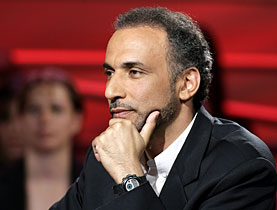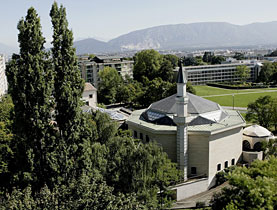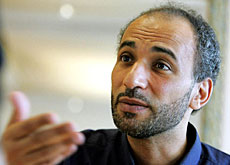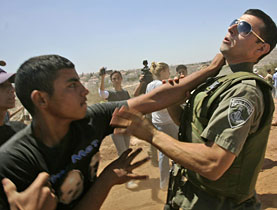“Muslims and Christians need humility”

Groundbreaking talks between Muslims and Roman Catholic officials are taking place in Rome, as both sides seek to improve dialogue and defuse tensions.
Swiss Islamic scholar Tariq Ramadan, who is taking part in the three-day discussions, tells swissinfo Christians and Muslims need to stop “acting like victims” and instead take responsibility for improving mutual relations.
The “Love of God, Love of Neighbour” talks come two years after Pope Benedict XVI’s controversial Regensburg address offended many Muslims.
There are 28 delegates from both sides at the forum, which began on Monday with discussions on Christian and Muslim views and teaching on love. The idea is to find common ground and ways of dealing with issues affecting the world.
Ramadan, a professor of Islamic studies at Oxford University, believes a constructive dialogue on shared values and ultimate goals is far more vital and imperative than rivalries over the number of believers and competition over exclusive possession of the truth.
swissinfo: What do you expect to come out of these talks?
Tariq Ramadan: I think it’s important to speak to each other but also to speak to our respective communities to make it clear that we have responsibilities towards each other.
We are also talking about things that are important in the way we deal with our respective values and working together in our world to face the coming challenges – the climate crisis or the economic crisis.
It’s also important to be able to discuss statements about Europe and the West and to go beyond a perception that we do not share principles in common. So it’s really about a critical discussion and coming to a better mutual understanding.
And what I’m saying in articles I have published in The Guardian and Le Monde [to coincide with the forum] is that we need the precondition of humility as to our own teaching, knowing that we don’t have the whole truth ourselves. That effectively means we have to listen to each other and to know that our messages are very often very great but our practices are far from being great.
swissinfo: It’s two years since the pope angered the Muslim world with a speech linking Islam with past violence. How have relations with the Vatican developed since then?
T. R.: They have developed positively. I think the negative perceptions of the Muslims have ended up today as something positive: an awareness that dialogue is needed, that we need to come together.
swissinfo: You told swissinfo in an interview a couple of years ago to coincide with the anniversary of September 11 that there was a deep lack of trust between Muslims and the West. How would you assess the situation now?
T.R.: Things are moving but still we are dealing with fear, we are dealing with mistrust, we are dealing with negative perceptions. The Pew Research Centre in the United States published a survey recently saying that 45 per cent of Europeans have a very bad image of Islam. And if you go to the Muslims, you will have a perception that the West is still dominating and arrogant.
So I think we all have to stop nurturing a victim mentality [and instead cultivate] a mentality of responsible men and women working together to change the situation.
swissinfo: What difference do you think it will make to the Muslim world that Barack Obama – a Christian but a black man with perhaps a different perspective – has been elected president of the United States?
T.R.: Of course, I supported Barack Obama. And I am hoping for new policies of security and more multilateral policies and not the unilateral ones we had under the Bush administration.
At the same time we should know that the room for manoeuvre is still narrow for any US president because it’s a very complex system. So when it comes to one of the crucial issues – the Palestinian-Israeli conflict – to go beyond the conflict and come to peace we need a very committed policy and that’s not going to be easy. I don’t think we can envisage changes in that field.
I think it cannot but be better than what we had in the past eight years so let us hope that things are going to move ahead.
swissinfo-interview: Morven McLean
There are around 2 billion Christians in the world – just over half of them Catholics.
There are 1.3 billion Muslims.
The Catholic-Muslim meeting is being attended by 28 Muslim delegates and the same number of Catholics.
The Muslim delegation is led by Grand Mufti of Bosnia Mustafa Ceric. Cardinal Jean-Louis Tauran is heading the Vatican officials.
The meeting follows a Muslim conference with United States Protestants in July and one with Anglicans last month.
Tauran said the talks at the Vatican marked “a new chapter in a long history” of often strained relations between the Catholic Church and Islam.
Right to worship
The Vatican has called for “reciprocity”, with Christians allowed to worship in churches in Muslim nations just as Muslims in the West have the right to worship in mosques.
Pope Benedict was expected in his address at the meeting to deplore prejudice against Muslim minorities and immigrants in Europe, while also calling on Muslims to help defend Christian minorities persecuted or endangered in the Middle East, including recently Iraq.
The veil
In 2006 a senior Vatican cardinal, Renato Martino, expressed concern over the use of some Muslim veils by Islamic immigrants in Europe.
The cardinal said immigrants must respect the traditions, culture and religion of the nations they go to.
Apostasy
According to most scholars, if a Muslim voluntarily declares his rejection of Islam and does not change his mind after the time given to him by a judge for research, then the penalty for male apostates is death and for women life imprisonment.
The New Testament does not mention any punishment for apostasy, although the Old Testament demands death by stoning (Deuteronomy 17:3-5).

In compliance with the JTI standards
More: SWI swissinfo.ch certified by the Journalism Trust Initiative



You can find an overview of ongoing debates with our journalists here. Please join us!
If you want to start a conversation about a topic raised in this article or want to report factual errors, email us at english@swissinfo.ch.